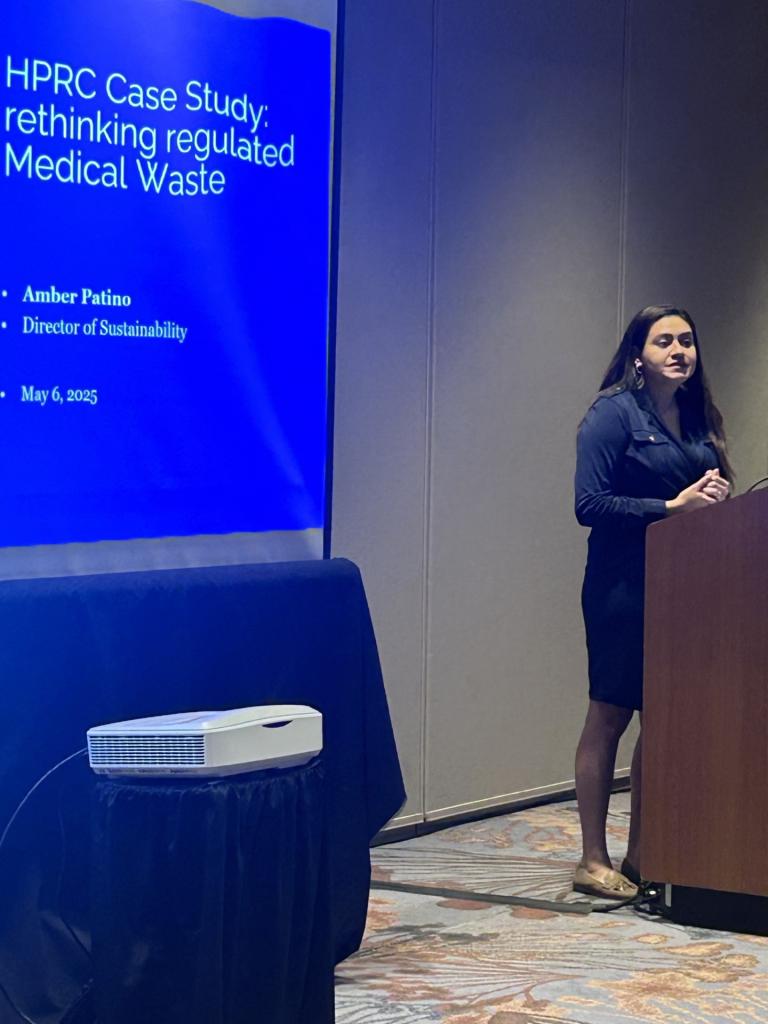Envetec Insight
Redefining Healthcare Plastics: A Sustainable Future for Waste Management
The healthcare sector is under increasing pressure to address its environmental impact, and plastic waste is a significant concern. We’ve just returned from CleanMed 2025, where healthcare leaders explored innovative solutions for a more sustainable future. A key theme was the urgent need to rethink how we manage plastic waste, moving beyond traditional disposal methods to embrace circularity.
Innovative Approaches to Healthcare Plastics Recycling
During the session on Innovative Approaches to Healthcare Plastics Recycling, Houston Methodist and Northwell Health shared their strategies for tackling this challenge. Their case studies highlighted the importance of reimagining systems, designing for the long term, and exploring the potential of healthcare waste.
Houston Methodist: A Practical Framework for Clinical Recycling
Jason Fisher from Houston Methodist outlined the development of an effective clinical waste collection program within a large hospital network. With over 34,000 employees and nine hospitals, the challenge lies in creating a scalable model across various departments and locations.
Houston Methodist is focusing on specific high-volume items, including saline flushes, blue wrap, PVCs, and gloves. They are conducting targeted pilots, such as the Choose Peak PVC recovery program, which focuses on recovering and reusing PVCs, a commonly used plastic in healthcare. They are also exploring ways to backhaul materials for centralised processing. This targeted approach is crucial for effective waste recycling within a complex healthcare environment.
Northwell Health: Rethinking Regulated Medical Waste Treatment with Innovative Technology
Northwell Health, in collaboration with Envetec, has implemented GENERATIONS, a clean technology that enables the safe, on-site waste treatment of regulated medical waste. Installed at its Core Lab, one of the largest health system-based laboratories in New York, GENERATIONS converts waste that would typically be autoclaved, incinerated, or sent to a landfill into a non-infectious, recyclable feedstock.
The Core Lab manages over 500,000 pounds of waste each year. With GENERATIONS, Northwell is reducing its carbon footprint, enhancing compliance, and establishing a foundation for a more circular approach to healthcare materials management. The technology also captures real-time data on waste and emissions, providing valuable insights into volumes, reductions, and operational performance.
“We are not just managing risk — we are unlocking the potential for full circularity in medical waste. This could be a first in healthcare,” said Amber Patino, Director of Sustainability at Northwell Health.
To date, the system has treated over 100,000 pounds of regulated medical waste, receiving full approval from the U.S. Environmental Protection Agency and the New York State Department of Health. This demonstrates the viability of innovative biohazardous waste treatment companies.

The Importance of These Approaches
Both Houston Methodist and Northwell Health are responding to increasing pressure from regulatory agencies, internal sustainability objectives, and a broader commitment to minimising the environmental impact of healthcare.
Their efforts offer two practical models for progress:
- A system-wide strategy focused on sorting and recovering high-volume clinical items.
- A technology-driven solution that transforms RMW treatment into valuable feedstock for circularity.
While the paths differ, the intent remains the same: to stop treating healthcare waste as something to discard and, instead, to view it as a resource that can be managed responsibly. This shift in perspective is crucial for the future of biohazardous waste recycling.
The Future of Healthcare Waste and Circularity
The conversation at CleanMed made one thing clear: the way hospitals manage plastic waste is entering a new era—one driven not only by internal sustainability goals but also by regulatory and market pressure.
As Extended Producer Responsibility (EPR) legislation gains traction and scrutiny of Scope 3 emissions intensifies, hospitals can no longer rely on outdated waste disposal methods. The question is no longer whether hospitals should innovate in waste management, but how quickly they can do so responsibly. This is particularly relevant for regulated waste treatment companies operating in Ireland and the UK.
At Envetec, we are proud to support this transition. With GENERATIONS, hospitals can treat regulated medical waste safely, reduce reliance on incineration, and generate real-time data that supports climate reporting and circularity planning. This is not just a new way to manage waste; it is also a new way to see it: as a resource with potential, not a problem to discard.

Summary
Healthcare facilities are increasingly focused on sustainable waste treatment solutions, driven by regulatory pressures and internal sustainability goals. Houston Methodist and Northwell Health are leading the way with innovative approaches to clinical waste collection and biohazardous waste management.
Houston Methodist is implementing a practical framework for waste recycling by targeting high-volume clinical items. Northwell Health, in collaboration with Envetec, is using the GENERATIONS technology for on-site biomedical waste treatment, converting waste into recyclable feedstock and reducing their carbon footprint. These initiatives highlight the shift towards viewing healthcare waste as a resource rather than simply something to discard, paving the way for a more circular and sustainable future in healthcare.